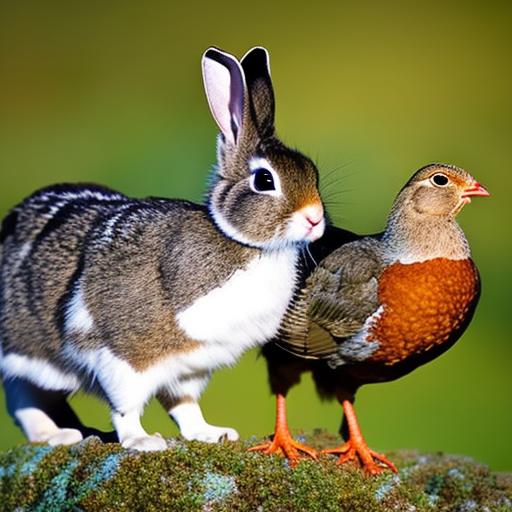Keeping rabbits and chickens together in a chicken coop is a topic that often sparks debate among animal enthusiasts. Many people believe that rabbits and chickens cannot coexist peacefully due to their different temperaments and needs. However, with proper planning and preparation, it is possible for rabbits and chickens to live harmoniously in the same coop. The purpose of this blog post is to provide information and tips for keeping rabbits and chickens together in a chicken coop, debunking the common misconception that they cannot coexist.
Key Takeaways
- Rabbits and chickens can coexist in a chicken coop, but it requires careful planning and consideration.
- Keeping rabbits and chickens together can provide benefits such as pest control and companionship.
- Factors to consider before keeping rabbits and chickens together include temperament, space requirements, and dietary needs.
- Choosing the right chicken coop and designing a plan that includes separate areas for rabbits and chickens is crucial for their well-being.
- Maintaining hygiene and cleanliness in the coop is essential to prevent the spread of disease.
Benefits of Keeping Rabbits and Chickens Together
There are several benefits to keeping rabbits and chickens together in a chicken coop. One of the main benefits is companionship. Rabbits and chickens can form bonds with each other and provide social interaction, which is important for their overall well-being. Additionally, rabbits are known for their ability to keep pests under control. They can help control the population of insects, such as flies and mosquitoes, which can be beneficial for both the rabbits and the chickens.
Personal experiences and anecdotes can also attest to the successful cohabitation between rabbits and chickens. Many people have reported that their rabbits and chickens have formed close bonds and have even been seen grooming each other. This companionship can provide comfort and reduce stress for both animals.
Factors to Consider Before Keeping Rabbits and Chickens Together
Before introducing rabbits to a chicken coop, there are several important factors to consider. One of the most important factors is temperament. Rabbits are generally more timid and sensitive than chickens, so it is important to choose rabbits that are known for their calm demeanor. Additionally, it is crucial to ensure that the chickens in the coop are not aggressive towards the rabbits.
Another factor to consider is space requirements. Both rabbits and chickens need adequate space to move around comfortably. It is important to research the space requirements for each species and ensure that the chicken coop is large enough to accommodate both animals.
Choosing the Right Chicken Coop for Rabbits and Chickens
When choosing a chicken coop for rabbits and chickens, it is important to consider their specific needs. There are different types of chicken coops available, such as traditional coops, mobile coops, and multi-level coops. It is important to choose a coop that provides enough space for both rabbits and chickens to move around comfortably.
Ventilation is also an important factor to consider when choosing a chicken coop for rabbits and chickens. Proper ventilation helps to regulate the temperature inside the coop and prevent the buildup of ammonia from animal waste. Additionally, security is crucial to protect both rabbits and chickens from predators. The coop should have sturdy walls and a secure door to keep out predators such as raccoons or foxes.
Designing a Chicken Coop Plan for Rabbits and Chickens
Designing a chicken coop plan that accommodates both rabbits and chickens requires careful consideration of their specific needs. One important aspect to consider is providing hiding spots for rabbits. Rabbits are prey animals and feel safer when they have places to hide. This can be achieved by providing boxes or tunnels in the coop where rabbits can retreat if they feel threatened.
Perches are also important for rabbits in a chicken coop. Rabbits are natural climbers and enjoy being able to perch on elevated surfaces. Providing perches in the coop can help satisfy this natural behavior and provide enrichment for the rabbits.
Ensuring Adequate Space for Rabbits and Chickens in the Coop

Both rabbits and chickens require adequate space in a chicken coop to live comfortably. It is important to research the space requirements for each species and ensure that the coop provides enough room for both animals.
To maximize space in the coop, it can be helpful to use vertical space. This can be achieved by adding shelves or platforms for the rabbits to climb on. Additionally, providing separate areas for rabbits and chickens can help ensure that each species has enough space. This can be done by using dividers or building separate hutches within the coop.
Providing Separate Areas for Rabbits and Chickens in the Coop
Providing separate areas for rabbits and chickens in the coop is important to prevent any potential conflicts between the two species. Chickens can be territorial and may become aggressive towards rabbits if they feel their space is being invaded.
One way to create separate areas is by using dividers within the coop. This allows rabbits and chickens to have their own designated spaces while still being able to see and interact with each other. Another option is to build separate hutches within the coop, providing each species with their own private space.
Feeding Rabbits and Chickens in the Same Coop
Rabbits and chickens have different dietary needs, so it is important to provide separate feeding stations or different types of feed in the same coop. Rabbits require a diet that is high in fiber, such as hay and fresh vegetables, while chickens require a diet that is high in protein, such as grains and insects.
To ensure that each species receives the appropriate nutrition, it can be helpful to provide separate feeding stations. This can be as simple as placing feeders at different heights or using dividers to create separate feeding areas within the coop.
Maintaining Hygiene and Cleanliness in the Coop
Maintaining hygiene and cleanliness in a chicken coop with rabbits and chickens is crucial for the health and well-being of both animals. Regular cleaning helps prevent the buildup of waste and reduces the risk of disease.
Using natural cleaning solutions, such as vinegar or lemon juice, can help maintain a clean and safe environment for both rabbits and chickens. It is also important to remove waste regularly to prevent ammonia buildup, which can be harmful to the respiratory systems of both animals.
Tips for Keeping Rabbits and Chickens Together in a Chicken Coop
In conclusion, rabbits and chickens can coexist peacefully in a chicken coop with proper planning and preparation. It is important to consider factors such as temperament and space requirements before introducing rabbits to a chicken coop. Choosing the right chicken coop, designing a coop plan that accommodates both rabbits and chickens, and providing separate areas for each species are all important considerations.
Feeding rabbits and chickens separately, maintaining hygiene and cleanliness in the coop, and monitoring their behavior are also crucial for successful cohabitation. By following these tips and providing enrichment activities for both rabbits and chickens, it is possible to create a harmonious living environment for both species in a chicken coop.
If you’re considering keeping rabbits and chickens together, it’s important to understand the dynamics between these two animals. While they can coexist peacefully in some cases, there are certain factors to consider. One important aspect is providing appropriate housing for both species. To learn more about creating a suitable environment for your rabbits and chickens, check out this informative article on chicken coop run plans at PoultryWizard.com. It offers valuable insights and practical tips on designing a coop and run that can accommodate both rabbits and chickens comfortably.
FAQs
Can rabbits and chickens live together?
Yes, rabbits and chickens can live together in the same coop or run as long as they have enough space and are introduced properly.
What are the benefits of keeping rabbits and chickens together?
Keeping rabbits and chickens together can provide mutual benefits such as companionship, pest control, and manure management.
What are the risks of keeping rabbits and chickens together?
The risks of keeping rabbits and chickens together include the potential for aggression between the two species, the spread of diseases, and the possibility of rabbits eating chicken feed.
How should rabbits and chickens be introduced?
Rabbits and chickens should be introduced slowly and carefully, with supervision. It is best to start by keeping them in separate enclosures next to each other before gradually allowing them to interact.
What should the living conditions be like for rabbits and chickens living together?
The living conditions for rabbits and chickens living together should be spacious and clean, with separate areas for each species to retreat to if needed. The coop or run should also be secure to protect them from predators.
What should I feed my rabbits and chickens if they are living together?
Rabbits and chickens have different dietary needs, so it is important to provide them with separate feeders and to ensure that they are not eating each other’s food. Consult with a veterinarian or animal nutritionist for specific dietary recommendations.
Meet Walter, the feathered-friend fanatic of Florida! Nestled in the sunshine state, Walter struts through life with his feathered companions, clucking his way to happiness. With a coop that’s fancier than a five-star hotel, he’s the Don Juan of the chicken world. When he’s not teaching his hens to do the cha-cha, you’ll find him in a heated debate with his prized rooster, Sir Clucks-a-Lot. Walter’s poultry passion is no yolk; he’s the sunny-side-up guy you never knew you needed in your flock of friends!







